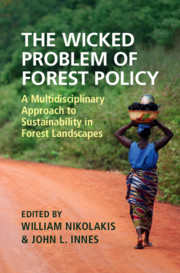 The Wicked Problem of Forest Policy
The Wicked Problem of Forest Policy Book contents
- The Wicked Problem of Forest Policy
- The Wicked Problem of Forest Policy
- Copyright page
- Contents
- Contributors
- 1 The Wicked Problem of Forest Policy
- Part I Wicked Problems and Policies
- Part II Tools to Address Wicked Problems
- 9 The Wicked Problems of Indonesia’s Forests Require Effective Institutions to Resolve Difficult Trade-Offs
- 10 Power to the Forest People
- 11 How Are Land-Use Multi-stakeholder Fora Affected by Their Contexts?
- 12 Sustainable Landscape Investment
- 13 Community Forestry in Liberia
- 14 Are Some Forestry Problems Too Wicked?
- Index
- References
9 - The Wicked Problems of Indonesia’s Forests Require Effective Institutions to Resolve Difficult Trade-Offs
from Part II - Tools to Address Wicked Problems
Published online by Cambridge University Press: 24 July 2020
- The Wicked Problem of Forest Policy
- The Wicked Problem of Forest Policy
- Copyright page
- Contents
- Contributors
- 1 The Wicked Problem of Forest Policy
- Part I Wicked Problems and Policies
- Part II Tools to Address Wicked Problems
- 9 The Wicked Problems of Indonesia’s Forests Require Effective Institutions to Resolve Difficult Trade-Offs
- 10 Power to the Forest People
- 11 How Are Land-Use Multi-stakeholder Fora Affected by Their Contexts?
- 12 Sustainable Landscape Investment
- 13 Community Forestry in Liberia
- 14 Are Some Forestry Problems Too Wicked?
- Index
- References
Summary
The Kehicap (Symposiachrus boanensis) or Black-chinned monarch is a bird species whose entire world population of 100–200 individuals survives in a few tiny patches of forest on the remote Indonesian Island of Buano in the Moluccas. The main threat to the Kehicap is fuelwood gathering by a relatively small population of local people. The habitat of the Kehicap is a protected forest (Hutan Lindung), and local people are violating the law when they harvest fuelwood. The future of the Kehicap is a classic example of a wicked problem. There is a direct conflict between measures to protect the species and the livelihoods of local people. There are huge and irreconcilable differences in their understanding of what the problem is – or even of whether there is a problem. Policies to counter forest loss and degradation have fallen short in achieving these goals. Devolution of forest management to local communities offers promise but also challenges. Wicked problems cannot all be solved one at a time – they will cease to exist when mature and effective institutions emerge to regulate the activities of a prosperous and well-educated population.
- Type
- Chapter
- Information
- The Wicked Problem of Forest PolicyA Multidisciplinary Approach to Sustainability in Forest Landscapes, pp. 261 - 277Publisher: Cambridge University PressPrint publication year: 2020
